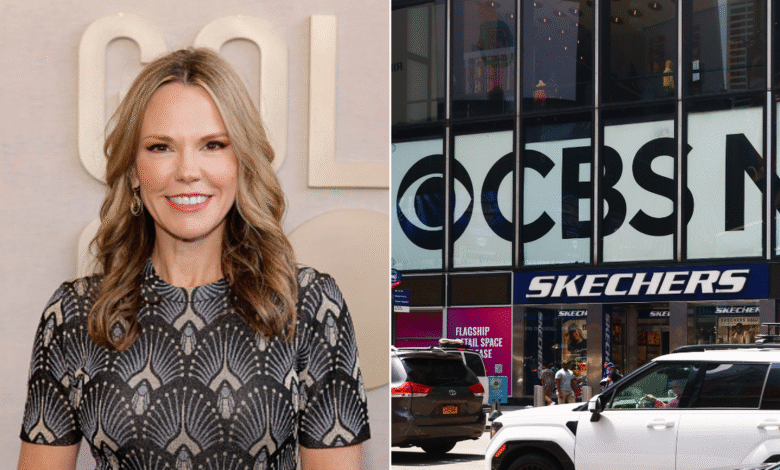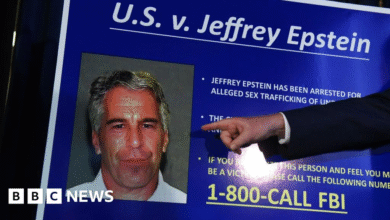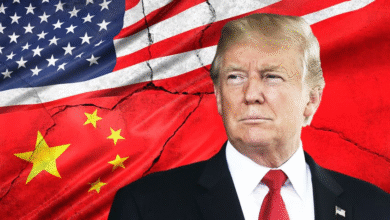Wendy McMahon Resignation Marks CBS News Leadership Shift

In a stunning turn of events, CBS News CEO Wendy McMahon has announced her resignation, marking a pivotal moment amidst ongoing leadership changes at Paramount Global. This decision underscores the escalating tensions between McMahon and Shari Redstone, the controlling shareholder of Paramount, revealing deep-seated rifts over editorial direction and corporate governance. Recent controversies surrounding coverage decisions, including how CBS approached the Israeli-Palestinian conflict, have intensified criticism of McMahon’s leadership, as the company navigates a landscape fraught with scrutiny and instability. The resignation comes at a time when Paramount Global is also contending with regulatory hurdles related to proposed mergers, further complicating its news division’s strategies. As the dust settles from the departure of McMahon, the implications for CBS News and its editorial autonomy in the face of corporate influence remain to be seen, as all eyes turn to the future of leadership within the media conglomerate.
In the realm of media and journalism, the recent resignation of Wendy McMahon from her role as CEO of CBS News has ignited discussions about the ongoing reshuffling within Paramount Global’s news division. This leadership change is not merely a shift in personnel but highlights the larger narrative of conflicts influenced by corporate power dynamics and editorial independence. With Paramount’s ambitions in media mergers and acquisitions, particularly with their complex dealings involving notable stakeholders like Shari Redstone, McMahon’s exit raises critical questions about the future direction of CBS News. Furthermore, the intersection of media integrity and corporate oversight comes into sharp focus as the company grapples with its identity amidst external pressures. As Paramount moves forward with its strategic goals, the ramifications of McMahon’s resignation will undoubtedly shape the landscape of news reporting and ethical considerations in the industry.
Wendy McMahon Resignation: A Turning Point for CBS News
The resignation of Wendy McMahon as CEO of CBS News marks a significant upheaval in the media landscape, highlighting the turbulent dynamics within Paramount Global’s news division. McMahon’s decision to step down follows months of escalating tensions with Shari Redstone, the controlling shareholder, over editorial independence and company direction. This conflict hints at deeper issues brewing within CBS News as it prepares to navigate an uncertain future after her departure.
Now, with McMahon’s resignation, CBS News may face challenges in maintaining journalistic integrity, especially during a period marked by high-stakes media mergers and acquisitions. The internal disagreements regarding coverage of sensitive topics such as the Israeli-Palestinian conflict reflect an ongoing struggle for balance between editorial freedom and corporate influence. As Paramount Global seeks to assert control to navigate its financial landscape, this leadership shift raises questions about the network’s future direction.
The Impact of Paramount Global on CBS News Leadership Changes
Paramount Global’s influence over CBS News has increasingly come to the forefront, particularly in light of recent leadership changes. The company has placed substantial pressure on its news division, particularly around key programming decisions for shows like “60 Minutes.” Under its governance, the network has seen a shift towards tighter control over editorial content, heightening scrutiny over decisions made by seasoned journalists.
As a result, the leadership shake-up following Wendy McMahon’s resignation demonstrates how paramount board members, including Redstone, aim to reshape CBS News’ editorial focus to align with broader corporate goals. This strategy raises concerns about the integrity of news reporting within CBS, as traditional boundaries separating journalistic freedom from business interests become increasingly blurred.
The Shari Redstone Controversy: Straining Relationships in CBS News
The ongoing tensions between Shari Redstone and CBS News leadership have underscored the complexities inherent in media ownership and editorial control. Throughout her tenure, McMahon has faced mounting criticism from Redstone, including concerns about fairness in news coverage. This contentious relationship has fueled speculation regarding the effectiveness of McMahon’s leadership and the strategic priorities set forth by Paramount Global.
Moreover, the Redstone controversy sheds light on larger issues within the media industry, particularly as major players navigate the intersection of corporate interests and journalistic ethics. The internal debates over journalism’s role in addressing controversial subjects suggest that the future of CBS News may hinge on the evolving relationship between its executives and corporate stakeholders, compelling leaders to constantly reconcile these diverging priorities.
Editorial Decisions Under Fire at ’60 Minutes’ Amid Leadership Changes
Amid the leadership changes at CBS News, editorial decisions at “60 Minutes” have come under increased scrutiny, raising significant concerns about journalistic integrity. Wendy McMahon’s efforts to advocate for the show’s editorial independence were met with resistance from the Paramount board, leading to fears that critical coverage might be stifled. The recent resignation of veteran executive producer Bill Owens exemplifies the strain placed on professionals attempting to fulfill their roles under mounting corporate pressure.
This situation exemplifies the delicate balance that media executives must maintain between upholding journalistic standards and satisfying corporate demands for favorable content. As the parameters for what constitutes an acceptable story are redefined amid corporate mergers and external pressures, the future of “60 Minutes” and similar programs may hinge on the ongoing negotiations of independence versus corporate alignment within the realm of news.
Navigating Media Mergers and Acquisitions: The CBS News Context
As Paramount Global seeks to consolidate its media assets through mergers and acquisitions, the landscape for CBS News is changing rapidly. McMahon’s departure signals not just a leadership transition but a potential redirection of editorial strategy to fit the evolving goals of the conglomerate. The implications of such mergers on media reporting and journalistic standards have sparked debate amongst industry professionals and observers alike.
The intricate dance of media mergers often brings forth questions about content oversight and editorial independence. With Paramount’s attempt to merge with Skydance Media currently tangled in regulatory scrutiny, the pressures on CBS could escalate, as management may feel compelled to tailor programming to align with the interests of shareholders. This backdrop raises concerns about how such business maneuvers might alter the fabric of CBS News’s identity and commitment to objective journalism.
Understanding Editorial Autonomy in the Age of Corporate Control
In an era where corporate control over media outlets intensifies, the importance of editorial autonomy cannot be overstated. Wendy McMahon’s resignation highlights the friction that can arise when financial objectives overshadow journalistic values, particularly within the operational framework of a major news organization like CBS. Maintaining a free press and unbiased reporting is crucial for public trust, especially as media companies face increasing influence from corporate stakeholders.
As discussions around corporate interventions in news content grow louder, the need for clarity in defining the lines between editorial independence and corporate objectives becomes paramount. The developments surrounding CBS News remind us that the balance of power in the media industry is constantly shifting, often jeopardizing the integrity of journalism in favor of strategic business goals.
Future Implications for CBS News Following Leadership Restructuring
The aftermath of Wendy McMahon’s resignation invites speculation about the future direction of CBS News. As the network grapples with the repercussions of internal conflicts and external pressures, its leadership will play a crucial role in shaping the narrative and maintaining credibility in a competitive media climate. Paramount Global’s decisions in appointing McMahon’s successor will signal the company’s investment in balancing editorial freedom with shareholder interests.
Moreover, the evolving context of corporate media requires CBS News to adapt strategically to ensure sustainability and relevance. This challenge not only involves nurturing journalistic talent but also investing in innovative reporting practices that can withstand the pressures of external scrutiny. As the news division moves forward, it will be imperative to cultivate an environment that respects journalistic integrity while effectively responding to stakeholder expectations.
The Intersection of Journalism and Corporate Interests in CBS News
The complex interplay between journalism and corporate interests remains a pivotal point of discussion following Wendy McMahon’s resignation from CBS News. As Paramount Global navigates its merger strategies and seeks to align content with broader business objectives, the challenge of maintaining editorial independence persists. This dichotomy raises critical questions about the survival of journalistic principles in an environment that often favors sensationalism over substantive reporting.
The manner in which CBS News reconciles its commitment to public interest with the demands of corporate governance will significantly impact its future trajectory. As media stakeholders continue to push for control over narrative framing, the responsibility of the news division to uphold transparency and accountability will be put to the test, compelling industry leaders to rethink their approaches in a rapidly evolving media landscape.
The Challenges Ahead for CBS News Amid Changing Leadership Dynamics
With Wendy McMahon’s resignation, CBS News faces a turbulent transitional phase that requires a strategic reevaluation of its operations and editorial stance. The leadership change could serve as a catalyst for meaningful reform, especially if a successor is chosen who values independent journalism and can effectively navigate corporate pressures. However, as the influence of Paramount Global permeates deeper into the news division, there is a risk that essential journalistic values could be compromised.
Navigating these changes will challenge CBS News to not only address internal disputes but also reassure audiences of its commitment to unbiased reporting. Fostering an environment that champions journalistic integrity while still meeting company expectations will be critical as the network endeavors to retain trust among viewers amidst an environment marked by skepticism towards corporate media.
Frequently Asked Questions
What led to Wendy McMahon’s resignation from CBS News?
Wendy McMahon’s resignation from CBS News was a result of escalating tensions between her leadership and Paramount Global’s controlling shareholder, Shari Redstone. Key issues included disagreements over CBS’s editorial decisions, particularly regarding coverage of controversial topics such as the Israeli-Palestinian conflict, and increased scrutiny from Paramount over ’60 Minutes’ content.
How did Shari Redstone influence Wendy McMahon’s resignation?
Shari Redstone’s influence played a significant role in Wendy McMahon’s resignation as controlling shareholder of Paramount Global, as she expressed dissatisfaction with McMahon’s leadership and CBS News’ performance. The pressure on McMahon was amplified by recent conflicts over editorial independence, particularly concerning ’60 Minutes’ decisions.
What were the key conflicts between CBS News and Paramount Global leading to McMahon’s exit?
The key conflicts leading to Wendy McMahon’s exit involved Paramount Global’s increased oversight of CBS News content, including the management of ’60 Minutes’ editorial decisions. This included disagreements over coverage of politically sensitive issues and heightened scrutiny from the board, which contradicted traditional journalistic independence.
What impact did Wendy McMahon’s resignation have on CBS’s news division?
Wendy McMahon’s resignation is expected to have a significant impact on CBS’s news division, as it underscores the ongoing leadership struggles within Paramount Global. This shake-up comes amid critical discussions about editorial integrity, especially relating to how ’60 Minutes’ operates under increased corporate oversight, potentially altering the division’s future direction.
What were the repercussions for ‘60 Minutes’ after the leadership changes involving Wendy McMahon?
Following Wendy McMahon’s resignation, ’60 Minutes’ has faced repercussions including increased pressure regarding content approvals from Paramount Global, which could affect the show’s traditional editorial independence. This tension has led to the resignation of veteran executive producer Bill Owens, highlighting concerns over journalistic integrity.
How does Wendy McMahon’s resignation fit into the larger context of media mergers and acquisitions?
Wendy McMahon’s resignation can be viewed within the broader context of media mergers and acquisitions as Paramount Global seeks to merge with Skydance Media. The leadership divide likely reflects internal challenges faced during this transition, illustrating how corporate governance can impact news operations and editorial freedom.
What statements did Wendy McMahon make in her resignation letter?
In her resignation letter, Wendy McMahon acknowledged the challenges of recent months and emphasized a divergence in vision between herself and the company. She stated it was time for her to move on, highlighting the need for CBS News to advance under new leadership amid the ongoing conflicts with Paramount Global.
What role does corporate governance play in media leadership changes like McMahon’s resignation?
Corporate governance plays a crucial role in media leadership changes, as seen in Wendy McMahon’s resignation. When controlling shareholders like Shari Redstone exert influence over editorial policies and decision-making processes, it can lead to significant shifts in company leadership, affecting how news organizations operate and deliver content to audiences.
| Key Point | Details |
|---|---|
| Wendy McMahon’s Resignation | CBS News CEO Wendy McMahon announced her resignation amid internal leadership conflicts with Paramount Global’s Shari Redstone. |
| Power Struggle | The resignation highlights ongoing tensions between McMahon and Redstone, especially regarding editorial decisions. |
| Increased Scrutiny | There has been increased pressure from Paramount’s board for details on ’60 Minutes’ programming prior to air dates. |
| Previous Tensions | Disagreements over CBS’s coverage of various political issues contributed to the conflicts. |
| Paramount’s Merger | Paramount Global is also facing challenges with its merger with Skydance Media amidst regulatory considerations. |
| Editorial Independence | Veteran CBS producers have expressed concerns over losing journalistic independence due to increased levels of oversight. |
Summary
Wendy McMahon’s resignation marks a significant development in the tumultuous landscape of CBS News and its ongoing leadership struggles. As the former CEO departs amidst rising tensions with Paramount Global’s Shari Redstone, the impact of this decision is likely to shape the future of CBS’s editorial direction and corporate strategy, especially as the company navigates its proposed merger with Skydance Media. The ramifications of this leadership change will be closely watched by both industry insiders and the public.




